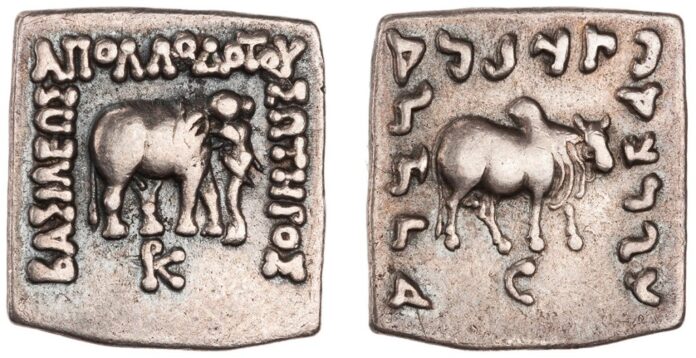The American Numismatic Society (ANS) announces that the National Endowment for the Humanities (NEH) has awarded the Society a $150,000 grant for the two-year joint ANS – Oxford University OXUS-INDUS project. The award comes through the New Directions in Digital Scholarship in Cultural Institutions program that partners the NEH with the United Kingdom’s Arts and Humanities Research Council (AHRC) intended to fund trans-Atlantic co-operative projects. At the ANS, Dr. Peter van Alfen and Ethan Gruber will be working with their partners Prof. Andrew Meadows and Dr. Simon Glenn at Oxford University, who are funded by the AHRC, along with Dr. Gunnar Dumke at Martin-Luther-Universität Halle-Wittenberg in Germany, to create a new online typology and research tool for ancient Graeco-Bactrian and Indo-Greek coinage.
For many of the rulers of the Graeco-Bactrian and Indo-Greek kingdoms, which existed between c. 250 BCE and the beginning of the first century CE and covered areas of modern Afghanistan, Turkmenistan, Uzbekistan, Tajikistan, Pakistan, and India, coins are often the only surviving evidence of their existence. Formed in the wake of Alexander the Great’s incursion into the region, these kingdoms remain some of the least understood and most understudied political and social entities of the ancient world. Indeed, only eight of these kings are known from literary, epigraphic, and archaeological sources, while over 40 can be identified on coins alone, an astonishing disparity in source material that underscores the importance of the numismatic evidence for our understanding of these early rulers and their interactions with those they ruled.
Tens of thousands of these coins exist today, dispersed in collections, both public and private, across the globe, not just in Europe, the UK and US, but, rather importantly, in Afghanistan, Pakistan and India as well. With standard reference works out of print and only existing in French and English, it is difficult for scholars, curators in cultural institutions holding these coins, and law enforcement agencies tasked with the combatting of the illegal trade in antiquities, to engage with the material at a number of different levels. Lacking, in many cases, basic and accurate typological information describing where, when, and who produced the coins, the potential of these collections to serve as historical resources and points of reference remains currently locked. The OXUS-INDUS project aims to resolve current cataloguing, identification and collection accessibility problems by providing a multilingual, freely accessible, and technologically sophisticated Linked Open Data web-based portal that will offer a new, up-to-date typology of the coins. This new tool will also allow access to the images and data of thousands of coins, initially incorporating the major collections of the ANS, Ashmolean Museum, Bibliothèque nationale de France, Fitzwilliam Museum, Cambridge, Leeds University Library, Staatliche Museen zu Berlin, and, more critically, the State Bank of Pakistan.
“We are thrilled by this latest NEH award to the Society,” said ANS Executive Director Dr. Gilles Bransbourg, “particularly since it gives us the ability to work with colleagues not just in the UK and Europe, but also in Pakistan, including Prof. Gul Rahim Khan at the University of Peshawar and Dr. Asma Ibrahim at the State Bank of Pakistan, on a group of coinage very much in need of an updated typology and accessible resources.” ANS President Dr. Ute Wartenberg, who was recently appointed to the Board of the ICOM International Committee for Money and Banking Museums, added “The OXUS-INDUS project is a wonderful opportunity for the ANS to form still stronger ties with sister institutions around the globe on an important new initiative.”
More information about the OXUS-INDUS project is available on the ANS blog or on the website of the Centre for the Study of Ancient Documents.




